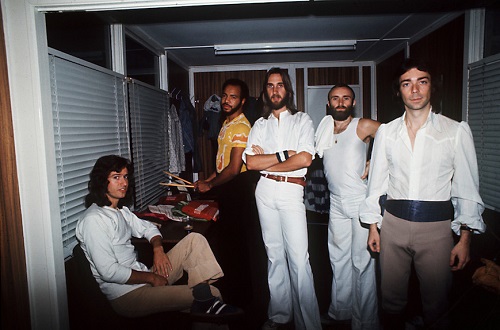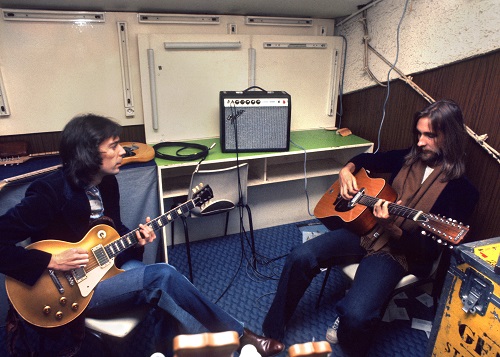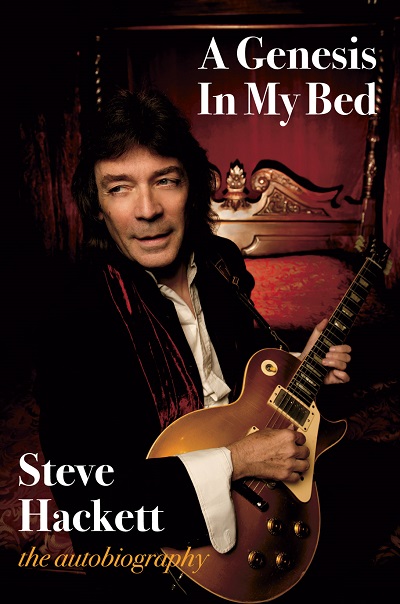By Ira Kantor
Despite being forced to end his most recent tour abruptly per the COVID-19 pandemic, guitar legend Steve Hackett remains as busy as ever.
After 50 years in the music business, the chameleon-like artist is firmly ensconced in octopus mode. Even while hunkered at home, he’s laying down acoustic and rock tracks for separate albums, conversing with fans and telling tales about standout solo and Genesis songs via social media, and prepping the release of his autobiography. Due out in July, A Genesis In My Bed (from Wymer Publishing), does a fine visual job of breaking down its subject’s upbringing, iconic Genesis and solo careers, respectively, and several other surprises even die-hard fans may not be familiar with.
As Hackett himself says: “I keep it coming. I’m working every day flat out to produce new stuff. The factory fires are burning.”
I recently chatted with Hackett about his upcoming projects, standout anecdotes from his autobiography, his relationship with Genesis bandmates, and — given his being a big bibliophile — what books he currently can’t put down.
~
I guess the first obvious question is how are holding up right now, given the COVID-19 pandemic?
I’m throwing myself into work and recording at home right now. It’s a very productive time. Although I’m frustrated on one level, I’m very pleased with the way recording’s going. I’ve got a number of projects up and running but at the moment I thought I’d concentrate on trying to do an orchestral or rather an acoustic album that has orchestra — an instrumental album. But I have some tracks recorded for a rock album as well. I have a live album that’s ready to go in September. There’s the book coming out in July — the autobiography. We’re kind of trying to raise the bar in terms of the amount of stuff we can bring out and keep up standards. It’s a bit like “In work we trust” really.
What made now the optimal time to assemble your autobiography?
It’s really been 15 years work. I started this that long ago. There’s been so much touring and recording. I really needed a period of time and a deadline to be able to bring it through. Most of it was done before our last American tour. Our tour was cut short because of the pandemic. I didn’t have any choice there. There were venues booked, there were tickets sold, but states were individually closing down places. We were about halfway through. Luckily the book was basically 99.9 percent done by then and then, of course, because we came back early, we had a little bit more time on hand to be able to work on it further. I thought, ‘Oh perhaps I need some anecdotes. I left out this person and that person. Maybe tighten it up a little bit in places.’
Doing a book, it’s pretty hard work. I’ve made lots of albums, done occasional little films, but I have to say doing a book — it’s major. It’s not like doing a blog or making a speech, doing an interview. You have to have serious continuity of thoughts. There you are – that’s it then, it’s for others to judge! (laughs)
Normally you would have a launch and you’d show up and this that and the other. I obviously won’t be able to do that. Once again you have the choice always — do you bring out your product at the perfect time or do you just accept the fact that conditions aren’t perfect for something like this and you just go ahead anyway and say, ‘Well the next project is the following.’ So I tend to go for continuity over perfection. You have to put your ideals to one side with this kind of stuff. The last album I did, for instance, I was going to have a launch at HMV in London and then suddenly they went into administration and again tickets sold and we just couldn’t show up for that. So I did something much smaller and much more provincial. That isn’t the point though; the point is you keep it coming. For instance, at the moment I’ve been doing a number of videos at home, doing track chat things. Sometimes playing live, sometimes playing tracks fans have asked for that I can talk about. Talk about how these things were made and bits of information people might not have heard so far. There are all sorts of things — like film of me playing at C.S. Lewis’ house. When I wrote “Narnia,” I was invited there several times and I was literally playing in the garden of the house where he wrote The Chronicles of Narnia and many other books. So that’s just gone up.
The main thrust of everything I’m saying to you is I keep it coming. I’m working every day flat out to produce new stuff. The factory fires are burning.
There are several interesting elements in your autobiography I’m hoping we can discuss. For example, you describe living for a time as a child in Vancouver, Canada. I know this specific location has significance for Phil Collins musically — did it influence you musically at all?
I was seven years old when we emigrated to Canada and for me it was the first glimpse of the wide-open spaces as a child. I had barely even seen the sea and then suddenly you’ve got an ocean crossing which lasted five days; a chance to see icebergs; the extraordinary event of landing in Quebec where there was this essentially ticker tape welcome – it was a bit like confetti at a wedding but just on such a larger scale. We could see it as the boat was approaching and my mother said, ‘Oh that’s for us!’ I think about it and it was a huge emotional rush. The Canadians were extraordinarily welcoming.
Then there was the fabulous journey across the whole of Canada on Canadian Pacific Railways with the observation platform and I was up there the whole time. My eyes were wide open. I absolutely loved Vancouver. The place where we were staying was literally 30 seconds walk from Jericho Beach, which is still absolutely beautiful. Whenever I go back and get a chance to see it, I get a lump in the throat. I was all set to be a Canadian through and through. I went to school there, learned the national anthem. It took me a long time to unlearn being a newfound Canadian, but we were back four months later. My mother, brother and I, we were back in London. My mother got terribly homesick, thought she had made a mistake, missed her family like crazy.
So many friends came out in order to make a new life in Canada but most of them came back. Apart from a couple of aunts of mine who went out later and remained and had children. My two aunts lived out their lives there and have both since passed on, but I remember them as young girls. It’s impossible for it not to affect me. It was a huge part of my childhood. It was the big adventure. To say I’ve got a soft spot for Canada is an understatement. Canada has been very good to me during Genesis times and beyond. It’s a very interesting place with very progressive thinking. Extraordinary.

Another anecdote I enjoyed reading was your staying over at Peter Gabriel’s house the night you joined Genesis. You mention playing records all night — what did you each play one another?
Oh goodness me! I think I was playing him some Buffy Sainte-Marie and he was playing — let me see — he very much liked the band Spirit. He liked the guitar sound and their two records I remember straight off.
Beyond that night, we both enjoyed blues. Pete was more into soul. As a guitarist I think blues was firing me up. There was quite a lot of influence of folk music. Joni Mitchell, I seem to remember was mentioned and not just for the songwriting but also for her guitar work. I remember Mike Rutherford saying that he very much liked Joni Mitchell’s guitar sound on various tracks so that was important. A lot of early Genesis stuff was based on acoustic guitar.
One of my favorite stories is when you buy a leather jacket at Kensington Market from someone who turns out to be none other than Freddie Mercury. Did you ever connect with him after that occurrence or get to know him further?
It’s a funny thing. He was a very sweet guy and a very good salesman. But the thing is I remember meeting Queen — some of the guys from Queen — in Brazil. I was meeting Roger [Taylor] and Brian May. Brian I got to work with on a couple of projects later on. Brian was telling me that I’d influenced him. My guitar work had influenced him — I had no idea of that at the time, but he mentioned the track “Musical Box.”
When I was making the GTR album with Steve Howe, Queen were in the same studio next door and they showed up for a birthday party of mine but it became very, very crowded very, very quickly and I didn’t get a chance to say hi to Freddie all those years later. It’s a shame I didn’t get to connect with him and compliment him on his extraordinary work.
Another story that stands out for me is your dealing with stage fright later in your career. Can you describe that experience and its aftermath?
It was at the time when I wasn’t doing that many gigs. Nothing like now where I’m doing tons and tons of gigs, or I was until we all stopped for lockdown. I was playing with an orchestra live for the first time and I learned a piece of Vivaldi. I was determined to get that right. I was playing at the Queen Elizabeth Hall in London and I played that and it was fine. I relaxed at the end of it and thought, ‘Oh that’s gone very well.’ Great response from the crowd and the orchestra. And then the orchestra leader turned to the audience and he said, ‘Would you like to hear some of Steve’s music?’ And he hadn’t said to me that he was going to do that. I was completely unprepared. I wasn’t ready and I really stumbled through something that was very familiar. I came off stage with my confidence absolutely rocked at that point. That’s what led me to see the hypnotherapist on the recommendation of my doctor.
I think it was a two-prong thing really because had I been doing more concerts; I don’t think I would have been feeling the pressure quite so much. When you do a run of gigs, that’s just the way it is. You stay busy and you don’t have really time to think about am I nervous, am I not? I think every band when they get on stage, you can tell that everyone’s hoping that everything is going to go well. But everyone puts that to one side as you launch into something. Most of the time things work. If you’ve got a good group, got a good band, most things work. Things occasionally go wrong but as I say I think it was at a time in my life when these things all converged. But I’m certainly over that now and I love playing live and I don’t have any issue with that at all.
You break down your solo album output in tandem with your work in Genesis. Do you feel there are underrated solo albums or songs of yours that resonate strongly with you that maybe didn’t catch on with fans initially?.
I see it all as one really. I see it all as one body of work. I never think to myself, ‘Oh what a shame that album didn’t do as well as so and so.’ What I’m proud of usually is how good I think those songs are and when individuals respond to those songs. I’ve not been usually motivated to deliver it to the idea of how much they sell. The Genesis stuff has obviously sold the most but that isn’t the point. That was the launchpad for everything I do.
For instance, I’m very proud of a lot of the acoustic albums I’ve done and every time someone said to me, ‘Oh I really liked that acoustic album’ like Bay Of Kings or Momentum of even Sketches Of Satie I did with my brother. The stuff gets used for film and it’s quite interesting how that comes back. And then there are pieces of Bach that I’ve recorded for the tribute album…I know it’s getting out there but it’s a more anonymous thing. You’re adding a footnote to all the pieces of Bach that were every recorded by lots of different artists. So I see it in terms of personal satisfaction really. It would be great if everything was a billion seller but isn’t it better to do a billion albums and keep the standard up?
You describe in your autobiography what the Genesis Revisited shows and albums mean to you. Have the guys in Genesis ever shared any insights with you about your reworking of the band’s material?
Yeah.
No, I’ve heard absolutely nothing from them in regards to that and I wouldn’t dream of asking them what they think of it. Although, I have to say at the launch of Mike Rutherford’s book (The Living Years), Tony Banks was there and he said, ‘You’re keeping the legacy alive.’ That’s how he saw it. I expected another reaction from him, but I think that was positive and it was quite surprising. Surprisingly positive.
Do you maintain good relationships with your Genesis band mates?
I see them from time to time. The last person I saw from the band was Peter Gabriel. I was attending an art show where photographs and paintings were being sold and the proceeds were going to WITNESS, which is something Pete very much supports. Basically, it’s a branch of Amnesty International. I think that that’s very important for him and I’m very pleased that he’s involved with those sorts of social issues. It’s always very nice to see him as we’re basically friends. The last time I saw the other guys was when Richard Macphail’s book came out (My Book Of Genesis) — four out of five of us showed up for that and it was very nice to see everybody.
One last question, knowing that you’re a big reader — which books are you currently tackling?
Actually, it’s a book that a friend of mine has given to me. It’s Ancient Evenings, an Egyptian story by Norman Mailer. It’s the most extraordinary book. Hardly a regular book at all. There’s that and I very much like Shantaram by Gregory David Roberts, an Australian writer. Very, very interesting. A story of India and an escaped Australian convict and extraordinary stories. Very brutal but very poetic. An interesting mixture.

To purchase a signed copy of A Genesis In My Bed, go to https://store.hackettsongs.com/products/a-genesis-in-my-bed-book.




















